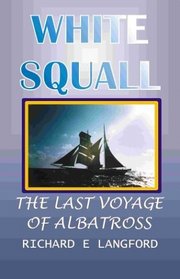Search -
White Squall : The Last Voyage Of Albatross
White Squall The Last Voyage Of Albatross
Author:
No one can describe Mr. Langford's book with more understanding than the Captain of the Albatross. "Dick Langford was a tremendous asset on the school voyage of the Brigantine Albatross. He was a great human being, a leader of the young students, and a fine English teacher.He has written a vivid, dramatic account about the ship's final, fatal vo... more »
Author:
No one can describe Mr. Langford's book with more understanding than the Captain of the Albatross. "Dick Langford was a tremendous asset on the school voyage of the Brigantine Albatross. He was a great human being, a leader of the young students, and a fine English teacher.He has written a vivid, dramatic account about the ship's final, fatal vo... more »
ISBN-13: 9781892216366
ISBN-10: 1892216361
Publication Date: 1/1/2001
Pages: 124
Rating: ?
ISBN-10: 1892216361
Publication Date: 1/1/2001
Pages: 124
Rating: ?
0 stars, based on 0 rating
Publisher: Bristol Fashion Publications
Book Type: Paperback
Members Wishing: 7
Reviews: Amazon | Write a Review
Book Type: Paperback
Members Wishing: 7
Reviews: Amazon | Write a Review
Genres:
- History >> Americas >> Mexico
- History >> Americas >> United States >> 20th Century >> 1960s
- History >> World >> Transportation >> Ships >> General
- Nonfiction >> Transportation >> General
- Nonfiction >> Transportation >> Ships >> History




